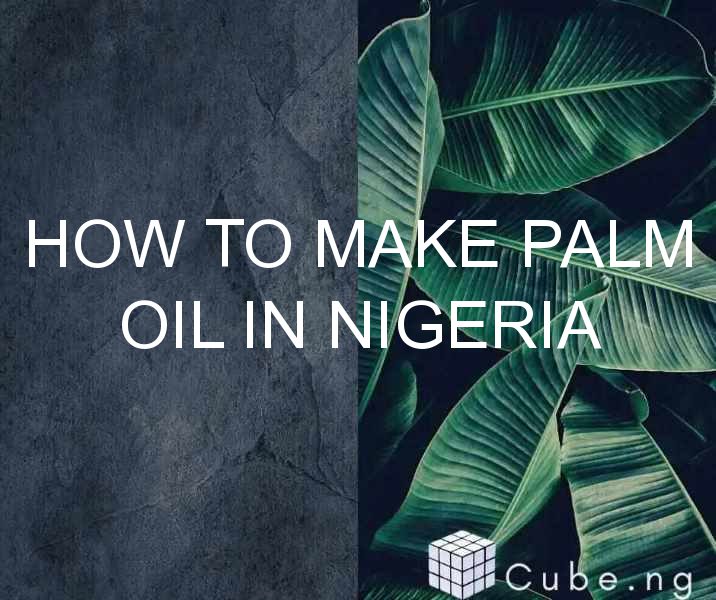Table of Contents
How to Make Palm Oil in Nigeria
Palm oil is a vital ingredient in West African cuisine, and its popularity has made it a staple in the Nigerian diet. The oil is extracted from the fruit of the oil palm tree and is used in cooking, cosmetic and industrial products. In Nigeria, the production of palm oil is a significant source of income for farmers, and the process of making it has been passed down through generations. In this article, we will explore how to make palm oil in Nigeria, from the cultivation of the oil palm tree to the extraction of the oil.
Cultivating the Oil Palm Tree
Before you can make palm oil, you need to have oil palm trees. The oil palm tree is a tropical plant that grows in Nigeria and other parts of West Africa. The tree can grow up to 20 meters tall and has a lifespan of up to 30 years. To cultivate the oil palm tree, you will need to:
-
Choose a suitable location: The oil palm tree grows best in tropical regions with high rainfall and temperatures. Choose a location with well-drained soil and adequate sunlight.
-
Plant the seedlings: Purchase oil palm seedlings from a reputable supplier and plant them in rows with a spacing of 9 meters between each row and 9 meters between each seedling.
-
Fertilize the soil: Apply fertilizer to the soil to provide the oil palm tree with the necessary nutrients to grow.
-
Prune the tree: Prune the tree to remove dead or diseased branches, and to encourage healthy growth.
-
Harvest the fruit: The oil palm tree takes about 3-4 years to start producing fruit. Harvest the fruit when it is ripe, which is usually after 6-8 months from pollination.
Processing the Palm Fruit
After harvesting the palm fruit, the next step is to process it to extract the oil. The process of extracting palm oil is done using traditional methods, and it involves the following steps:
Step 1: Sorting and Washing
The palm fruit is sorted to remove any damaged or rotten fruit. After sorting, the fruit is washed to remove any dirt or debris.
Step 2: Boiling
The washed fruit is then boiled in water for about 30 minutes to soften the flesh and loosen the oil.
Step 3: Pounding
After boiling, the fruit is removed from the water and pounded using a mortar and pestle to separate the flesh from the nut. This process is repeated several times until all the flesh is removed.
Step 4: Separating the Oil from the Water
The mashed pulp is then placed in a press and squeezed to separate the oil from the water. The oil is collected in a container, while the water is discarded.
Step 5: Clarification
After separating the oil from the water, it is filtered using a cloth to remove any impurities.
Step 6: Boiling and Cooling
The filtered oil is then boiled again to remove any remaining water and impurities. After boiling, the oil is allowed to cool and solidify.
Conclusion
Making palm oil in Nigeria is a labor-intensive process that requires patience and skill. The cultivation of the oil palm tree is the first step, and it involves choosing a suitable location, planting the seedlings, fertilizing the soil, pruning the tree, and harvesting the fruit. After harvesting, the fruit is processed using traditional methods, which involve sorting and washing, boiling, pounding, separating the oil from the water, clarification, and boiling and cooling.
FAQs
- Is palm oil healthy?
Palm oil is high in saturated fat and should be consumed in moderation.
- How much palm oil can be produced from one tree?
One oil palm tree can produce up to 100 kilograms of palm oil per year.
- Can I make palm oil from home?
Yes, you can make palm oil from home using traditional methods.
- What are the uses of palm oil?
Palm oil is used in cooking, cosmetics, and industrial products.
- Is palm oil production sustainable?
Sustainable palm oil production practices are being developed to reduce the environmental impact of palm oil production.




